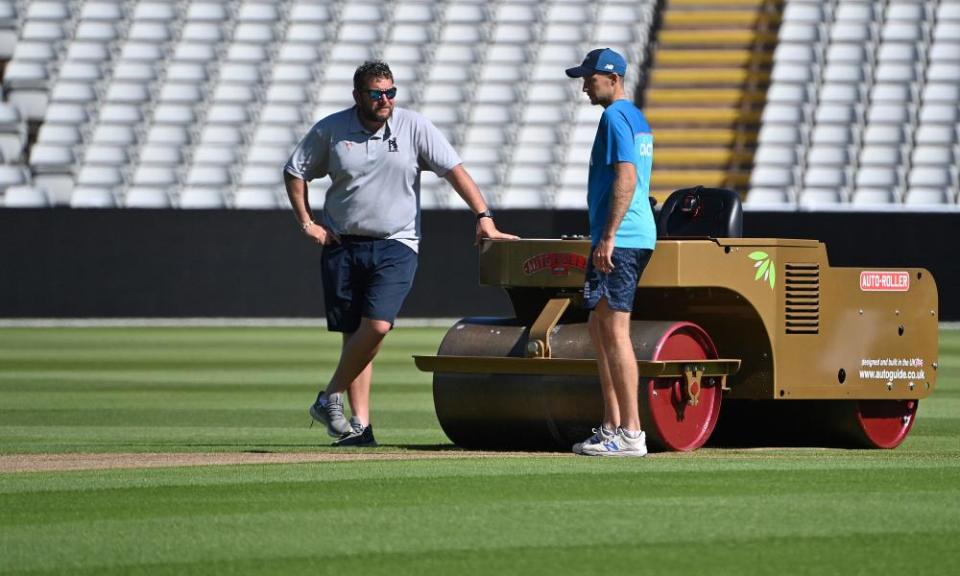‘The game needs a great series’: the pressures of preparing an Ashes pitch

Ben Stokes was asked in April what kind of pitches he was hoping to play on in the Ashes. His response was unequivocal. “We’ve been clear with the ground staff what type of wickets we want and they have been responsive,” he said. “We want flat, fast wickets.” In the hours after the interview was broadcast, Gary Barwell’s phone started pinging.
Barwell, head of sports turf and grounds at Edgbaston since 2011, will be responsible for the wicket used in the first Test and this news came as a complete surprise to him. “I was on holiday in Miami and I got sent the clip,” Barwell says.
Related: Ollie Robinson: ‘I felt I was never going to play cricket again’
“I can 100% tell you I have never been told that. I know they want good pitches, that’s all I’ve heard, and I don’t think that’s unusual. I’ve never been asked to produce a pitch for England in all the time I’ve been here. I get asked to produce a good cricket wicket and that’s it.”
If the situation was different at any of the four other grounds the England and Wales Cricket Board (ECB) has chosen for this year’s Ashes, Barwell would almost certainly know about it, the groundskeeper grapevine being particularly active. “Like anything, only the people that do the job understand the job,” he says. “All the first-class head groundsmen are on a WhatsApp group and they’re always supportive and helping each other.
“I can honestly say it’s as nice a bunch of people as you could ever wish to meet. On the first day of a Test I’ll have a load of messages, really genuine, wishing me good luck. If it doesn’t go right you’ll get messages asking how you are. It’s a real community feel, really embracing each other’s success.”
That community can be important because on the rare conditions when a pitch does not behave as expected there is no doubt who is getting the blame. “It can be a pretty lonely place,” Barwell says. “You watch the first ball go down and you want to see good carry and bounce, but if that ball doesn’t bounce you’re the only one who’s responsible. You have to put the big-boy shoes on and be the one standing up saying: ‘I didn’t quite get it right this time.’”

It is this community, Barwell says, has helped to push the quality of England’s pitches to new heights – with a bit of trickle-down effect from elsewhere. “Football’s got the money, of course it has, but the Premier League has been a real help in pushing standards. They back the grounds manager.
“With cricket, the progress that’s been made on pitches has been potentially a little bit despite ECB involvement rather than because of it. With the Premier League it’s one common goal to have an amazing pitch – rugby’s similar. The level of research and interaction with groundsmen from the ECB has not been at that level.
“I have more ideas in a day than is probably healthy and a lot of my colleagues do. In football, that’s nurtured more. The ECB do some really good stuff, some amazing stuff. But their lack of investment in ground staff, and their lack of investment in playing surfaces, has been disappointing.”
In the countdown to match day, Barwell will leave nothing to chance. He has all the kit: a lighting rig – second-hand, previously owned by Barcelona – to encourage the grass to grow, a tool called a Clegg impact hammer to measure the compaction levels of the soil (he will be looking for a Clegg reading of 240 on Friday morning), and a Trimble meter to test the chlorophyl profile of the grass (around 25% is ideal).
He will measure the height and density of the grass and the ground’s moisture level (30% or so is the sweet spot). “It’s a rough indicator of how the pitch may play,” he says. “But you’ll never hear me say how I think it will play because none of us know.”
What Barwell ideally wants is for nobody to notice the pitch at all. “Like football referees, the best pitches are the ones people don’t talk about. Ultimately, you’ve got a responsibility to the game, because the game needs a great Ashes series. But the way England have been playing whatever kind of pitch it is they’ll find a way of winning.”

